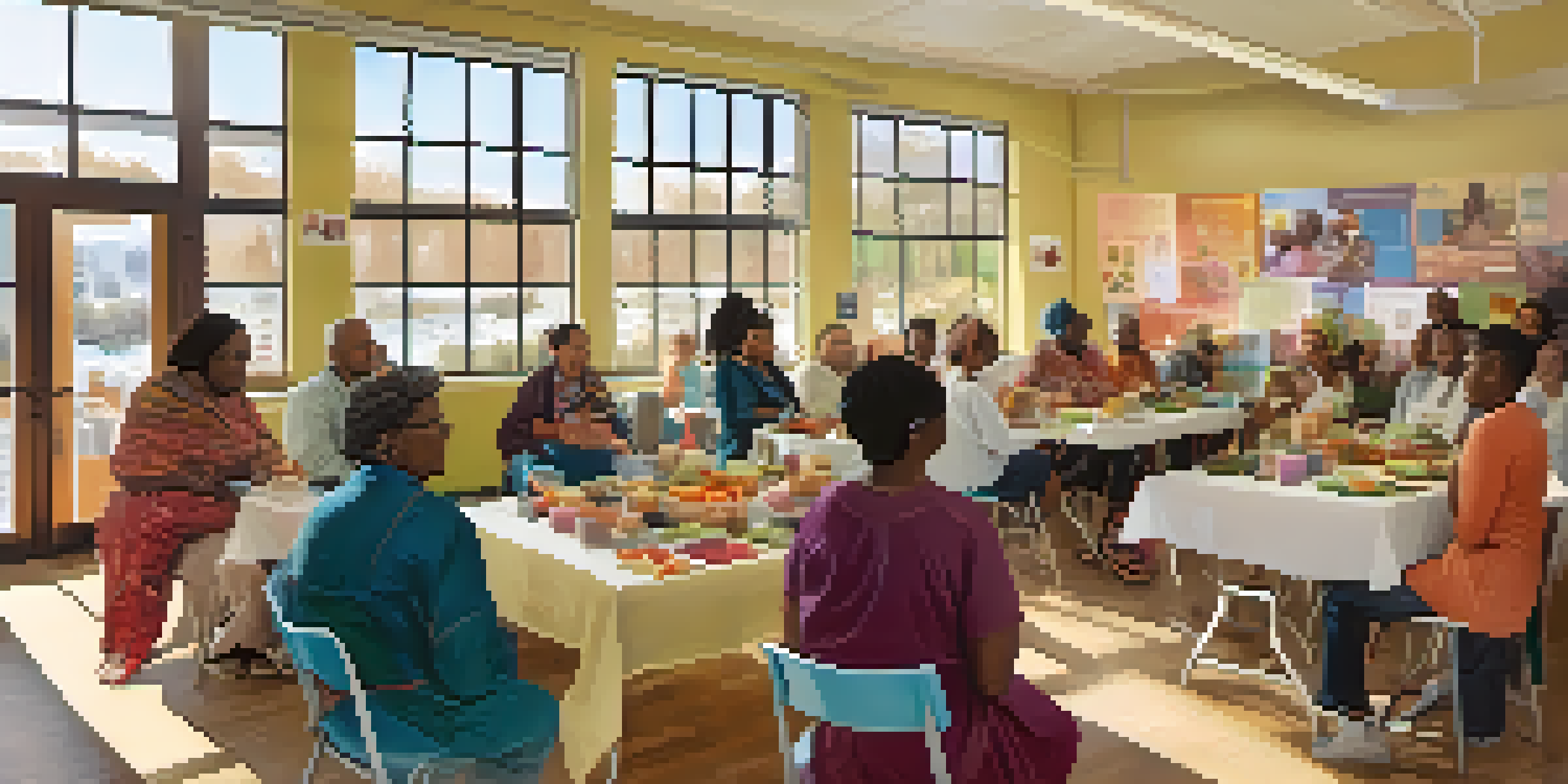Investigating the Role of Faith-Based Organizations in Health

Understanding Faith-Based Organizations and Their Mission
Faith-based organizations (FBOs) are groups that incorporate spiritual beliefs into their mission, often aiming to serve their communities. These organizations can range from local churches and mosques to larger international NGOs. Their primary goal is not just to promote faith but also to address various social issues, including health. By blending spiritual guidance with practical support, FBOs often create unique programs that resonate deeply with their communities.
Faith is taking the first step even when you don't see the whole staircase.
Many FBOs emphasize compassion and service, which aligns closely with health initiatives. They often provide services that address the physical, emotional, and spiritual needs of individuals. This holistic approach can lead to better health outcomes, as it encourages individuals to view their well-being in a more integrated manner. For example, a church might offer both mental health counseling and nutritional workshops, addressing multiple facets of health.
Moreover, the trust that communities place in these organizations can significantly enhance their effectiveness. When people feel connected to an FBO, they are more likely to seek help and participate in health programs. This trust can lead to increased engagement in health screenings, vaccination drives, and wellness education, ultimately fostering healthier communities.
The Historical Role of FBOs in Health Care Delivery
Historically, faith-based organizations have played a crucial role in providing health care, especially in underserved areas. Many hospitals and health clinics were initially established by religious groups, driven by a commitment to serve those in need. This legacy continues today, with numerous FBOs operating health facilities worldwide, often in places where government resources are lacking.

These organizations often fill gaps in healthcare access, offering services such as maternal care, vaccinations, and chronic disease management. For example, during health crises like epidemics, FBOs frequently mobilize quickly to provide care and support to their communities. Their established presence and understanding of local needs make them invaluable during such times.
FBOs Enhance Community Health
Faith-based organizations integrate spiritual beliefs with health initiatives, addressing physical, emotional, and spiritual needs to improve community well-being.
Additionally, FBOs often advocate for health policies that align with their mission of service and compassion. By engaging in community health education and outreach, they help raise awareness about important health issues, encouraging preventive care and healthy lifestyles. This advocacy work not only enhances their role in healthcare delivery but also empowers communities to take charge of their health.
FBOs and Community Health Programs: A Synergistic Approach
Faith-based organizations are particularly adept at designing community health programs that resonate with cultural and spiritual values. By integrating health education with community events, FBOs can reach individuals who might otherwise overlook traditional health services. For instance, a religious gathering can serve as an opportunity to distribute health information and resources, making the message more accessible.
The best way to find yourself is to lose yourself in the service of others.
These programs often focus on preventative health measures, addressing issues like nutrition, exercise, and mental health. For example, an FBO might host a wellness fair that includes health screenings, exercise classes, and cooking demonstrations. This multifaceted approach not only educates participants but also fosters a sense of community and support.
Moreover, by leveraging their networks, FBOs can mobilize resources and volunteers quickly. This agility allows them to respond to emerging health needs, such as mental health crises or substance abuse issues. As they tap into the community's strengths, FBOs create programs that are not only effective but also sustainable over time.
Collaboration Between FBOs and Health Care Systems
The collaboration between faith-based organizations and formal healthcare systems can lead to innovative solutions for health challenges. By working together, these entities can share resources, knowledge, and expertise, ultimately benefiting the communities they serve. For instance, a local hospital might partner with an FBO to provide health education and screenings in a trusted environment.
Such partnerships often enhance the credibility of health initiatives, as FBOs can help bridge the gap between healthcare providers and the community. When healthcare professionals work alongside trusted community leaders, it fosters a sense of security and encourages participation in health programs. This is particularly important in communities that may be hesitant to seek care due to historical distrust of medical institutions.
Historic Role in Healthcare Access
FBOs have historically provided essential healthcare services in underserved areas, continuing to fill gaps in access and support during health crises.
Additionally, collaborations can lead to more comprehensive care models. By combining spiritual care with medical treatment, patients receive holistic support that addresses both their physical and emotional needs. This synergy not only improves health outcomes but also strengthens the community's overall resilience.
Addressing Health Disparities Through FBO Initiatives
Faith-based organizations play a pivotal role in addressing health disparities, particularly in marginalized communities. They often identify the unique challenges that specific populations face, such as lack of access to healthcare or cultural barriers to seeking treatment. By tailoring their programs to meet these needs, FBOs can effectively bridge the gap in health equity.
For example, some FBOs offer transportation services to medical appointments or provide bilingual health education materials. These initiatives help remove barriers that prevent individuals from accessing necessary care. By focusing on the specific needs of their communities, FBOs empower individuals to take control of their health.
Furthermore, FBOs often advocate for broader systemic changes that address social determinants of health, such as poverty and education. Through community organizing and partnerships with other organizations, they can influence policy decisions that impact health outcomes. This advocacy work is essential for creating lasting change and ensuring that all individuals have the opportunity to achieve optimal health.
The Impact of FBOs on Mental Health Awareness
In recent years, faith-based organizations have increasingly recognized the importance of mental health. They often serve as safe spaces for individuals to discuss their struggles, providing support and resources in a non-judgmental environment. By integrating mental health awareness into their programs, FBOs help to destigmatize these issues within their communities.
Many FBOs offer counseling services, support groups, and educational workshops focused on mental well-being. These initiatives can be particularly impactful in communities where mental health resources are scarce. By promoting open dialogue and providing access to care, FBOs play a crucial role in enhancing mental health awareness and support.
Collaboration Boosts Health Initiatives
Partnerships between FBOs and healthcare systems create innovative solutions, enhancing the credibility and effectiveness of health programs in communities.
Moreover, the spiritual framework of FBOs can offer individuals comfort and hope during difficult times. By addressing mental health from a holistic perspective, FBOs encourage individuals to seek not only medical treatment but also spiritual guidance. This combination can lead to improved mental health outcomes and a stronger sense of community support.
Future Directions for Faith-Based Organizations in Health
As we look to the future, faith-based organizations are poised to play an even greater role in health initiatives. With the growing awareness of social determinants of health, FBOs can leverage their community connections to address issues like housing, education, and nutrition. By expanding their focus beyond traditional health services, they can create more comprehensive solutions for community well-being.
Emerging technologies also present exciting opportunities for FBOs to enhance their health initiatives. For instance, digital platforms can facilitate remote health education, telemedicine, and community engagement. This adaptability allows FBOs to reach a broader audience and provide support where it is needed most.

Ultimately, the future of FBOs in health will depend on their ability to innovate while staying true to their mission of service. By remaining connected to their communities and adapting to changing health landscapes, faith-based organizations can continue to be a vital force in promoting health and well-being for all.